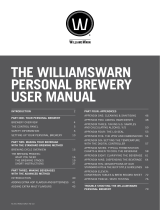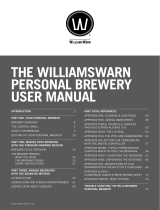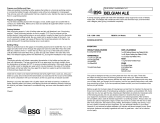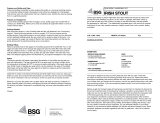Page is loading ...

at’s Included
at You’ll Need
These instructions will familiarize you with our STANDARD BREWING
PROCEDURES of the Mr. Beer
®
Home Brewing System. Each recipe will
produce about 1 case or 2 gallons of our standard beer (approx. 4% abv) in as
little as 5-6 weeks.
Once you are familiar with the basic principles of this brewing system, you will be
able to make a wide range of other beers using this kit.
Warranty Information
Mr. Beer
®
guarantees all products to be free from defects in materials and workmanship
at the time of purchase. If you find the product to be defective, please contact us and
we will work with you to resolve the issue.
Find our complete Warranty and Return Policy on www.mrbeer.com.
©2015 Coopers DIY, LLC. All rights reserved.
Pricing and product availability are subject to change without notice.
Contact Us
at
www.mrbeer.com
CORPORATE OFFICE
3366 N. Dodge Blvd
Tucson AZ, 85716-1573
Phone 1-800-852-4263
Fax 1-800-949-8542
• (1) 2 Gallon Keg Fermenter & Lid
• (11) 740-mL PET Bottles, Caps and (12) Labels
• (1) Spigot, Washer and Nut
• (1) Can of Brewing Extract
• (1) Packet of Yeast (Under lid of Brewing Extract)
• (1) Packet of No-Rinse Cleanser
• (1) Bag of Carbonation Drops (In selected kits only)
• (1) Detailed Printed Instructions
• (3) Gallons Water
• (1) 1-Gallon Container (Jug)
• (1) 3-Quart Pot (or Larger)
• (1) Metal or Hard Plastic Spoon/Whisk
• (1) Can Opener
• (1) Measuring Cup
• (1) Large Mixing Bowl
Step 5: Conditioning
Step 6: Care & Cleaning
Store the bottles upright and out of direct sunlight in a location with a consistent
temperature between 68°-76°F or 20°-24°C. If the bottles are exposed to a
colder temperature, they will take much longer to carbonate. If warmer than
76°F, off flavors can be accelerated in the bottles. Allow to sit for a minimum
of 14-21 days to allow full carbonation. One sure way to know your beer is
carbonated is to squeeze the bottles; if they are hard as a rock then your beer is
fully carbonated. Some bottles may finish more quickly than others, but given
more time, all will fully carbonate. The ideal conditioning time is 3 weeks.
To ensure your next batch of beer is as good as the first, you need to clean your
equipment immediately after use with soap and water. While rinsing is good,
only soap and water will result in clean equipment for your next brew. The best
cleaner to use on your brewing equipment is Oxygen Brewery Wash, available
at www.mrbeer.com. Oxygen Brewery Wash effectively breaks down residue
without leaving any flavor or foam-damaging residues after rinsing. If you
do not have Oxygen Brewery Wash, liquid soap works fine, as long as it is
unscented and is thoroughly rinsed off with warm water 105-115°F or 41-46°C.
Scented soap or improper rinsing can leave a film on your equipment that ruins
beer foam and leaves off flavors in your next beer.
1. Immediately after use, remove and disassemble
the spigot assembly from the keg, then
thoroughly wash all parts in warm water
using a clean, soft cloth and clear
unscented liquid soap.
2. Do not use scouring pads, wire
brushes, sponges or abrasives during
cleaning as they can harbor bacteria
and create small scratches that may
infect your beer.
3. Always clean all equipment immediately
after use.
Craft Homebrew t
Instructions

Spigot
Washer Keg Wall Nut
Step 1: Assembling the Spigot
Step 2: Cleaning
Step 3: ewing
Step 4: Bottling & Carbonating
1. Place washer on the spigot with the
beveled (narrower) edge facing the
threads, then insert spigot into keg.
Washer is outside of keg. Place
the nut with the wide flat side against
the inside keg wall and gently hand
tighten.
DO NOT OVER TIGHTEN.
2. Fill the keg with water then let the keg sit
for at least 15 minutes to test for leaks
no longer than 30 minutes, maximum.
3. Apply Mr. Beer
®
label to front of keg.
(Optional)
1. Remove the yeast packet from under the lid of the
can of Brewing Extract, then place the unopened
can in hot tap water.
2. Using the cleaned measuring cup, pour 4 cups
of water into your 3-quart or larger pot.
If Booster Pack is included add slowly while
stirring into cool water until dissolved.
Bring water to a boil, and then remove from heat.
3. Open the can of brewing extract and pour it into the
boiled water. Stir until thoroughly mixed. This mixture is called wort.
4. Fill fermenter with cold 40-55°F or 4-12°C water to line
mark 1 on the back.
TIP: For best results, use bottled spring water or charcoal-ltered
tap water between 40° and 60° F.
5. Pour the wort into the keg, and then bring the
volume of the keg to the line mark 2 by adding
more cold water. Mix vigorously with the spoon
or whisk.
6. Sprinkle the entire yeast packet into the keg,
then screw on the lid. Do not stir.
1.
When your beer is ready to bottle, fill a 1-gallon container
with warm water, then add the remaining ½ pack
of the No-Rinse Cleanser and stir until dissolved.
Once dissolved, it is ready to use.
2. Distribute the cleaning solution equally among
the bottles. Screw on caps and shake bottles
vigorously. Allow to sit 10 minutes, then shake
the bottles again. Remove caps
and empty all
cleaning solution into a large bowl. Use this solution
to clean any other equipment you may be using for
bottling. Do not rinse.
3. Add 2 carbonation drops to each 740-mL bottle. For 1-liter bottles, add 2 ½
drops; for ½-liter bottles add 1 drop. Alternatively, you can add table sugar
per the table below. For other bottle sizes see: http://www.mrbeer.com/help.
4. Holding the bottle at an angle, fill each bottle to about 2 inches from the
bottle’s top.
5. Place caps on bottles, hand tighten, and gently turn the bottle over to check
the bottle’s seal. It is not necessary to shake them.
1. Fill clean keg with warm water to the line mark 1
on the back, then add ½ pack (about 1 tablespoon)
of No-Rinse Cleanser and stir until dissolved. Once
dissolved, the solution is ready to use.
2. Screw on lid and swirl the keg so that the cleaning
solution makes contact with the entire interior of the
keg, including the underside of the lid. Allow to sit for
at least 2 minutes, and then swirl again.
3. Remove lid and place underneath the spigot, open the
spigot and fill the lid. Close the spigot and dispense the
cleaning solution from the lid.
3. Dispense all of the sanitizing solution into a large
bowl. Place your spoon, can opener, and measuring
cup into the bowl to sanitize and keep them cleaned
throughout the brewing process for at least 2 minutes
in cleaning solution before using utensils.
4. After all surfaces have been thoroughly cleaned, do not rinse or dry the
fermenter or utensils. Proceed immediately to the brewing process.
Cleaning is an essential step in the brewing process because it kills microscopic
bacteria, wild yeast and molds that may cause off flavors in your beer. YOU MUST
CLEAN ALL EQUIPMENT THAT COMES IN CONTACT WITH YOUR BEER.
Now, you’re ready to brew!
There are four ingredients needed to produce beer: malted barley, hops, yeast,
and water. The brewing process combines malt, hops and water to produce
wort (pronounced wert). The wort is then combined with yeast, and with a little
patience, the wort is transformed into beer. Mixing your first batch should take
about 30 minutes, but it isn’t beer until the yeast does its part. If you keep your
fermenting beer between 68°-76°F or 20°-24°C the yeast will stay happy, and
should finish between 14 - 21 days.
After 2-3 weeks, you will know the beer is ready to bottle and carbonate by
tasting a small sample. The beer should taste like flat beer. If the beer is sweet,
make sure that it is in the correct temperature range 68°-76°F or 20°-24°C and
let it ferment for a few days longer, but no longer than a total of 4 weeks. Once
fermentation is complete, you will transfer the beer into bottles and, depending
on bottle size, add the appropriate amount of priming sugar to produce the
proper level of carbonation. Carbonation is created when yeast metabolizes the
priming sugar to create carbon dioxide. Under pressure, the CO2 bubbles have
nowhere to go but to remain in solution. In order to carbonate the beer, it must
be transferred into bottles.
After a few days, the foam and activity will subside and your batch will appear to
be dormant. However, the yeast is still at work, slowly finishing the fermentation
process. Allow the fermentation approximately 2-3 weeks to ensure the process
is complete, and that the beer is well clarified and ready for bottling.
Caution:
DO NOT OPEN THE BREW KEG LID AT ANY TIME DURING
THE FERMENTATION PROCESS; THIS CAN CAUSE BEER SPOILAGE.
Caution:
TOO MUCH SUGAR AND/OR BOTTLING YOUR BEER
TOO EARLY MAY RESULT IN GUSHING OR BURST BOTTLES DUE TO OVER
CARBONATION. TOO LITTLE SUGAR WILL RESULT IN A FLAT BEER.
(Included in
most kits.)
500ml 740ml
1 Liter
1
Carbo Drop
or
1 tsp sugar
2
Carbo Drops
or
2 tsp sugar
2.5
Carbo Drops
or
2.5 tsp sugar
iming Sugar Chart
BOTTLE SIZE
½ Liter
¾ Liter (Incl. 740ml)
1 Liter
2 Liter
3 Liter
12 Ounce
16 Ounce
20 Ounce
22 Ounce
32 Ounce (1 Quart)
CARBO DROPS OR
1
2
2½
5
7½
¾
1
1½
1½
2½
TABLE SUGAR
1 tsp
2 tsp
2½ tsp
1½ tbsp
2½ tbsp
¾ tsp
1 tsp
1½ tsp
2½
2½ tsp
tsp = teaspoon tbsp = tablespoon
NOTE: Carbo Drops® can be easily cut in half using
a pill cutter.
Sugar priming is easy with
Mr. Beer® Carbo Drops.
/









